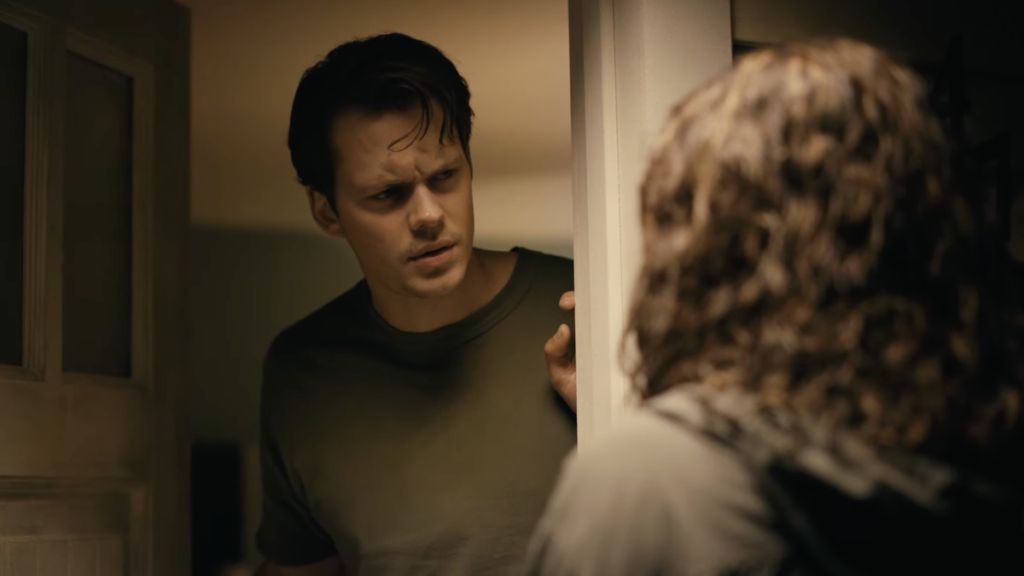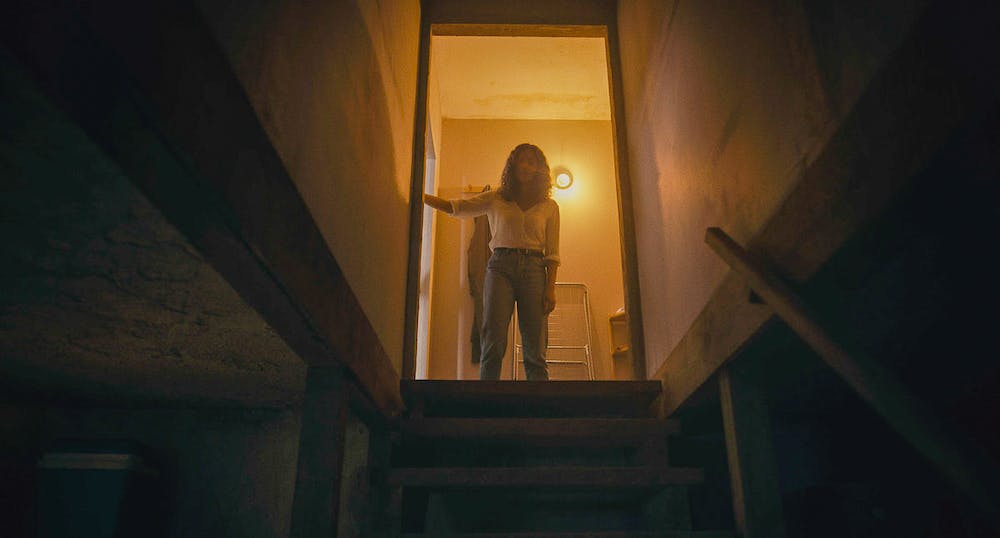Plus I offer you the golden rule of writing great horror!

So I checked out Barbarian today and, wow, what an opening act, huh? That has to be one of the best opening acts for a horror film ever.
Moments like this inspire me. You guys hear me complain about shows like Andor and movies like Nope, and it makes me sound like I’m some screenwriting curmudgeon who doesn’t like anything. But the reality is, I just want good writing. That’s it. If you give me good writing, I’m happy. And good writing is rare.
There’s, what, 700 shows on the air year-round? Probably 15 of them contain truly good writing. So, if we do the math, I’m only going to be double-dog dare down for something once a month. In the meantime, I have to be perplexed by shows like The Watcher, which, while it has its moments, occasionally feels like it was written by a 12 year old.
This specific month, being October, means I’m zoned in on horror movies. The horror genre is like any other genre in that it’s hard to execute. Even more so with the genre being so susceptible to cliches.
But it did get me thinking about horror today compared to horror 20 years ago, 30 years ago, 40 years ago. What does modern horror look like? And what can modern horror learn from classic horror? The opening act of Barbarian can tell us a lot.
What do you think of when you think ‘modern horror?’ What’s the movie that pops up in your head? For me, it’s “Get Out.” That movie has had the biggest influence on the genre in the past five years and its success basically boiled down to integrating social commentary into the movie.
This is combined with another (relatively) recent advancement in the horror genre which is putting a premium on character development. If there’s anything that my viewings of Friday the 13th and The Evil Dead taught me, it’s that older horror films put next to zero focus on character development. You didn’t know anybody in those films.
Why has this since changed? Well, there was a time when all horror films got bad reviews. Then Rotten Tomatoes was born. The growth of that site set up a certain expectation in viewers that a “rotten” score meant a movie wasn’t worth seeing. So the studios sat down and asked themselves, how can we get better horror RT scores? The answer was pretty simple – stop with the paper-thin characters. Give us characters we actually care about.
The Sixth Sense was a major participant in this change. That movie was about a boy who had a damaged relationship with his mother and a therapist who had a damaged relationship with his wife who was trying to right a wrong from failing a patient by helping this one. It was very much character-driven.
So that seems to be the trend now. Social commentary with a heavy focus on character development. Is this a good thing? Funny you ask. Because Barbarian answers that question almost as perfectly as you can answer it.

For those who haven’t seen the film, a young woman, Tess, comes to stay at an AirBnB in a poor Detroit suburb while in town for a job interview. But when she gets there, late at night, it turns out a guy, Keith, who says he rented the small home from a separate online rental service, is already there. It’s late. It’s raining. Keith says there’s a convention in town and all the local hotels are full. She might as well stay the night.
What follows is 25 minutes of us wondering if Keith is a bad guy and if he’s set this all up to trap Tess here so he can do God knows what. I suggest you watch the movie yourself before you keep reading this post (it’s free on HBO Max) because I have to get into spoilers. But what happens is, Tess eventually finds a secret room in the basement and both her and a highly suspicious Keith investigate it together. Then something horrid comes out of the shadows and slams Keith’s head against the rock wall repeatedly until his skull cracks.
Before we continue, I’m going to give you the secret to writing great horror.
This is the golden rule that will make you gobs of money if you can perfect it.
All great horror is, is a series of moments where you, the writer, imply something bad is coming, and then milk the suspense until that bad (or, if you want to twist it, un-bad) moment arrives. That is the first act of Barbarian in a nutshell and why it’s so brilliant.
We’re suspicious of Keith right away. Did he really rent this place? Or was he laying in wait? Is he really as good of a guy as he seems? Or is he secretly a monster? You see, once you set that potentially dangerous outcome up, you’ve got the reader on the fishing line. They are all yours.
From there, all you have to do is play with the situation (milk it for everything it’s worth!). So there’s a moment where Keith says, “I’m making tea. Do you want some?” We’ve all seen horror movies before. When a guy is making a drink for a girl, is he really just making her a drink? So you can play with that thread. Is Tess going to drink the tea? As it turns out, she doesn’t drink the tea, which is great, because it means they can suspend the situation even longer.
When you imply a terrible outcome is coming (Tess might be killed), good writers can string that along for five, ten, fifteen, and, in this case, 25 minutes. That’s the secret to writing good horror. You now know what you have to do: set up a potentially bad outcome and milk it. But you still need to practice how to extend the suspense out. Cause if you don’t know what you’re doing, you might invent a lot of silly unbelievable situations that break the magic.
What was so great about Barbarian was that all the suspense was built around real believable situations. Tess wakes up in the middle of the night to find her locked bedroom door open and Keith is on the couch having a nightmare, talking in his sleep. He couldn’t have opened the door. And even if he had, why draw suspicion to himself with the nightmare sleep-talk? So we’re really curious about where this is going.

However, once that first act ends, we jump into an entirely different story.
We cut to the Pacific Coast Highway where actor, AJ, gets a phone call from his agents telling him that he’s being accused of rape by his co-star. In other words, we go from a movie that’s entirely about horror and nothing else to straight social-commentary with a fair amount of focus on character development. It becomes the prototypical 2022 modern horror film.
So, the obvious question needs to be asked.
Did it become better or worse when it shifted from classic horror to modern horror?
I argue that once we cross that bridge, the movie loses something.
Now, to be fair, we’re so invested in this spooky house, which AJ finds himself in, that we’re still engaged in the movie. But I couldn’t help but notice that before AJ hit the screen, I’d forgotten I was watching a movie. I really did. And when he and his storyline entered the movie, I became very aware that I was watching a movie. I also became aware that Hollywood was preaching to me.
So what does this mean? Does this mean don’t write modern social commentary character-driven horror? Of course not. Modern horror is what’s selling! So I’m not going to tell you to avoid it. But I do think the audience has caught up to Hollywood. Because of this, they’re more likely to be pulled out of the movie when you preach to them. Whereas, if all you care about is scaring people, and you do what I told you to do above (imply danger is coming and milk it for everything it’s worth), you’re much more likely to write a horror film that everybody loves.
I haven’t seen Smile yet so maybe someone can tell me if there’s a social commentary angle or not. But certainly from the way they’re promoting it, it seems like it’s a movie that just wants to scare you. And how’s that working out for Smile? Oh yeah, it’s just the biggest horror success story in the past four years. That’s the audience telling you something.
But look, if you have a story to tell that you feel passionate about and the themes in it cover any issue (social or otherwise), you can still write a great horror script. It just has to be genuine and not pandering. If you want to know what “pandering” means, look at “They/Them.” That movie was so desperate to push a message that everyone hated it, even the core group it was targeted to. There are no teams when it comes to being annoyingly pandered to.
So don’t write a movie just to appease what Hollywood wants, whether it’s yesterday’s trend, today’s trend, or tomorrow’s. Write a movie that you would write regardless of if the trend existed. Cause when you’re passionate about an idea, that’s worth something on the page. Promising Young Woman was social commentary but you could tell that it wasn’t pandering. Emerald needed to tell that story no matter what.
It’s so funny that a single movie would come out that shows you, via a direct comparison, how true horror and modern horror compare. Who won? You decide.
And guess what? I have a treat for you guys. You can read the Barbarian script below if you don’t have HBO Max. Make sure to tell me what you think in the comments.
Script link: Barbarian
Do you want a script consultation with Scriptshadow? E-mail me if you’re looking to get feedback on your script. You can check out the consult page here but I also offer pretty much any feedback you need, from a logline to a script synopsis to your first act to your whole script! E-mail me at carsonreeves1@gmail.com and let me help you make your script great!

